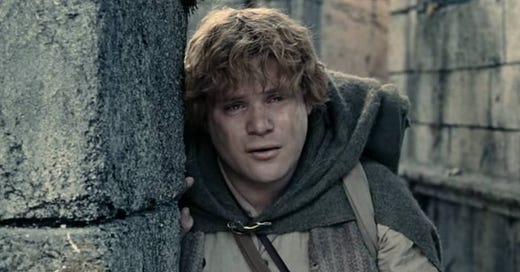At the end of August in my post “The Secrets Discovered to Keeping an Audience's Attention” I mentioned some research on the lessons from blockbuster films for communication and leadership and promised to come back to this - here I am.
Many films have pivotal speeches, moments when one character’s words of passion and wisdom get people to align, to come together, and overcome what needs to be overcome.
These speeches are often key moments and rouse us the viewer as well as the characters in the film. One such moment that springs to my mind is towards the end of the second film in the Lord of the Rings trilogy by Peter Jackson, The Twin Towers.
In this Frodo bearing the burden of carrying the ring which he must destroy is losing all hope - he is saved by Sam in the last moment from giving himself up to the Nazgul - and Frodo in his “trance” attacks Sam. And in response Sam gives a short speech, only 148 words, that manage to transform Frodo and imbibe a sense of hope and motivation in the viewer. 148 words from despair to hope. 148 wonderfully poignant words that resonate with all of us and finish with “That there’s some good in this world, Mr. Frodo. And it’s worth fighting for.”
It is precisely this type of rousing speech that Munyon and Summers wanted to investigate. They looked at how key scenes in films can motivate and engage and what is the format for doing this - “Emotions, Persuasion, and Team Adaptation: advancing Theory Through Cinema” is the title of the paper by Timothy Monsoon and James Summers.
Yes, these are rousing speeches that get the key characters in movies to overcome difficulties and eventually become heroes. But what is more interesting is whether we can use this in the workplace. Specifically the point is how can we leverage negative emotions such as anxiety and fear to engage people?
It is precisely this that these key scenes do in the movies - move people from despair to hope. Move people from fear to engagement. Move people from conflict to alignment. Therefore they provide key lessons and insights for leadership.
Sam’s 148 words:
“It’s like in the great stories, Mr. Frodo, the ones that really mattered. Full of darkness and danger they were, and sometimes you didn’t want to know the end, because how could the end be happy? How could the world go back to the way it was when so much bad had happened?
But in the end, it’s only a passing thing, this shadow. Even darkness must pass. A new day will come, and when the sun shines it will shine out the clearer. Those were the stories that stayed with you, that meant something, even if you were too small to understand why.
But I think, Mr. Frodo, I do understand. I know now. Folk in those stories had lots of chances of turning back. Only they didn’t, because they were holding on to something…That there’s some good in this world, Mr. Frodo. And it’s worth fighting for.”
Munyon and Summer analyse three movies’ critical scenes. In two "Braveheart” and "Remember the Titans" they see how fear and conflict can turn to hope and enthusiasm and the key is tapping into emotions, but more importantly in transforming emotions.
Keep reading with a 7-day free trial
Subscribe to leading brains Review to keep reading this post and get 7 days of free access to the full post archives.




